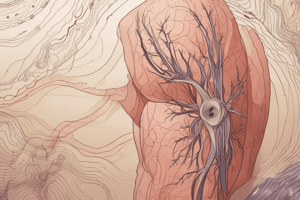Podcast
Questions and Answers
Which part of the nail is responsible for its growth?
Which part of the nail is responsible for its growth?
- Nail Plate
- Lunula
- Matrix (correct)
- Cuticle
What is the primary function of eccrine glands?
What is the primary function of eccrine glands?
- To secrete ear wax
- To produce milk after giving birth
- To produce oil for the skin
- To release sweat through the skin (correct)
Which part of the hair structure is responsible for hair growth?
Which part of the hair structure is responsible for hair growth?
- Keratin
- Hair shaft
- Hair bulb (correct)
- Hair follicle
Which gland is primarily associated with body odor?
Which gland is primarily associated with body odor?
What does the cuticle protect?
What does the cuticle protect?
Flashcards
Šta je to?
Šta je to?
To je slika.
Format slike?
Format slike?
Nepoznat format datoteke.
Digitalna slika?
Digitalna slika?
Da, verovatno predstavlja digitalnu sliku.
Šta je na slici?
Šta je na slici?
Signup and view all the flashcards
Šta je to?
Šta je to?
Signup and view all the flashcards
Nail Plate
Nail Plate
Signup and view all the flashcards
Nail Bed
Nail Bed
Signup and view all the flashcards
Hair Shaft
Hair Shaft
Signup and view all the flashcards
Eccrine Glands
Eccrine Glands
Signup and view all the flashcards
Sebaceous Glands
Sebaceous Glands
Signup and view all the flashcards
Study Notes
Organ Systems
- The human body is organised in levels of organisation
- Cell: Smallest unit of life (e.g., muscle cell)
- Tissue: Group of similar cells with same function (e.g., muscle tissue)
- Organ: Group of tissues working together for a specific role (e.g., heart)
- Organ system: Two or more organs working together (e.g., circulatory system)
- Organism: A living being (e.g., human)
Integumentary System
- Composed of skin, nails, hair, glands, and nerves
- Physical barrier protecting the body from bacteria, infection, injury, and sunlight
- Detects sensations like hot and cold
- Skin functions to protect internal organs and regulate body temperature
- Epidermis: Outer layer; produces pigments, protects, and provides water-proof barrier
- Dermis: Middle layer; contains nerves, sweat glands, hair follicles
- Subcutaneous tissue: Innermost layer; contains fat, connective tissues, and blood vessels
Skin
- Largest organ in the body
- Epidermis: Outer layer, produces pigment; protects against immune system and environment.
- Dermis: Contains nerve endings, sweat glands, and hair follicles
- Subcutaneous tissue: Innermost layer, composed of fat, connective tissues and blood vessels
Nails
- Protect ends of fingers and toes
- Consist of nail plate, nail bed, cuticle, and matrix(nail root)
Hair
- On head, eyebrows and eyelashes; protect eyes from dirt and warmth, insulate body heat
- Composed of hair shaft, hair follicle, and hair bulb
Glands
- Release substances (e.g., sweat, oil) onto the skin surface
- Sweat glands: Release sweat (eccrine and apocrine)
- Sebaceous glands: Produce sebum for hair and skin health
- Ceruminous glands: Produce earwax in ear canal
Studying That Suits You
Use AI to generate personalized quizzes and flashcards to suit your learning preferences.
Related Documents
Description
Ovaj kviz pokriva organizaciju ljudskog tela kroz nivoe organizacije, sa posebnim fokusom na integumentski sistem. Istražite funkcije kože, zaštitne uloge i slojeve koji čine ovaj vitalni organski sistem. Proverite svoje znanje o osnovnim funkcijama i strukturama prethodno navedenih sistema.




